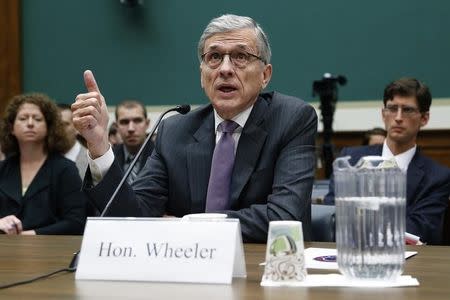U.S. FCC chief: Internet speed critical in broadband competition
By Alina Selyukh WASHINGTON (Reuters) - The U.S. market for broadband Internet connections is not competitive enough because many providers do not offer the speedy connections that consumers increasingly demand, the top U.S. communications regulator said on Thursday. Though most U.S. consumers have multiple options when it comes to picking a company to wire their homes for basic Internet, the choice is markedly limited if a consumer is looking for truly high-speed Internet, according to Federal Communications Commission Chairman Tom Wheeler. "There is an inverse relationship between competition and the kind of broadband performance that consumers are increasingly demanding. This is not tolerable," Wheeler said in a speech at tech startup incubator 1776 in Washington. "My goal is not to criticize but to recognize that meaningful competition for high-speed wired broadband is lacking and Americans need more competitive choices for faster and better Internet connections." Wheeler cited data showing that 75 percent of Americans can choose between two or three Internet service providers (ISPs) to deliver download speeds of 4 megabits per second (Mbps). But for speeds of 25 Mbps, 55 percent of U.S. households have only one option and almost 20 percent have none. In a study released in June, the FCC found that DSL services, though presented as competitors by other ISPs, delivered far slower speeds than they promised and generally lagged fiber and cable providers. "Traditional DSL is just not keeping up," Wheeler said on Thursday, adding also: "Today it seems clear that mobile broadband is just not a full substitute for fixed broadband." Another side of the FCC's data is that a notable portion of the U.S. population, particularly in rural areas, entirely lacks access to high-speed Internet, which is currently defined as 4 Mbps download speed and which Wheeler called inadequate. "That's yesterday's broadband," Wheeler said. "Even 10 megabits doesn't fully capture the increasing demand for better broadband." For comparison, Netflix recommends a 5 Mbps Internet speed to stream video in high definition. Consumers are increasingly using the Internet to stream music and videos, make calls or use other services that continue to demand faster speeds. The FCC is studying whether it should require that download speeds of 10 Mbps or higher for Internet service to qualify as broadband, or high-speed. Wheeler's speech, which FCC officials say is the first of a series, offered important insight into his thinking about broadband competition as his agency tackles numerous issues likely to be colored by this view. Among the hottest subjects on the FCC's agenda is a review of a proposed merger between top ISPs, Comcast Corp and Time Warner Cable Inc, which however do not directly compete against each other as their coverage areas do not overlap. Another issue recently under spotlight is the FCC's work to set new "net neutrality" rules that address whether ISPs should be able to charge content companies in some circumstances to ensure their websites or applications load smoothly and quickly. To read Wheeler's speech, see http://bit.ly/1o1tQ0F (Reporting by Alina Selyukh; Editing by David Gregorio)


